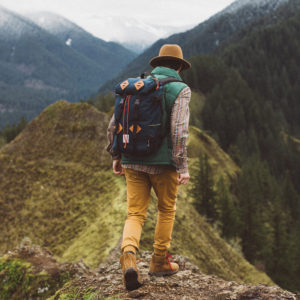 Every lover of nature knows and understands that not all the best camping spots can be reached with a vehicle. There are some spots that most impressive because no one knows about them. This often means that even off-road vehicles cannot venture to them. You have to set out on foot to reach them. It is a great and beautiful experience, but it does mean camping while on the trail can be a challenge.
Every lover of nature knows and understands that not all the best camping spots can be reached with a vehicle. There are some spots that most impressive because no one knows about them. This often means that even off-road vehicles cannot venture to them. You have to set out on foot to reach them. It is a great and beautiful experience, but it does mean camping while on the trail can be a challenge.
The Challenges of Camping on the Trail
 One of the biggest challenges for someone who wants to camp out while on the trail is finding the perfect spot. If you are going off the beaten path, how do you know that you are going to find heaven in nature? You may have a general idea of where you are going, what you will see, etc., but how do you truly know it is going to be the best spot for you until you arrive?
One of the biggest challenges for someone who wants to camp out while on the trail is finding the perfect spot. If you are going off the beaten path, how do you know that you are going to find heaven in nature? You may have a general idea of where you are going, what you will see, etc., but how do you truly know it is going to be the best spot for you until you arrive?
The next challenge, often the one that is toughest, is deciding what to pack. Packing for a hike is different than packing for a camping trip. Lighter is always better when you are hiking, but for camping, most of us want a little more comfort. It always falls on the burden of “lighter is better”. Forget the tackle box if you can find just a few of your favorite lures and a smaller thing to put them into.
When Weight Matters Most
 Would you want to carry a 10lb sledgehammer or a smaller hammer that can still get the job done? Does it change your mind if you know that you will be carrying it through the woods for five miles? Often, the heavy-duty sledgehammer could get the task completed faster, but you have to ask yourself if it is practical. The same with your change of clothes. Would you want to carry enough denim to weigh you down or would kakis work just as well?
Would you want to carry a 10lb sledgehammer or a smaller hammer that can still get the job done? Does it change your mind if you know that you will be carrying it through the woods for five miles? Often, the heavy-duty sledgehammer could get the task completed faster, but you have to ask yourself if it is practical. The same with your change of clothes. Would you want to carry enough denim to weigh you down or would kakis work just as well?
Most people who want to go lighter in weight will repackage items that come in larger quantities, they may carry a smaller LED flashlight over traditional ones, and carry only what is required for the time they will be gone. They want things that will help them survive. A small water bottle with a water filtration straw can provide ample drinking water without the weight of a gallon of water. Medications can be repackaged or consolidated to fit into a pillbox to save you from carrying multiple bottles. Insect repellent does not have to be in a large container or can. Hand sanitizer, personal hygiene items, and others can also be purchased in smaller bottles.
If you want, you can even take along an inexpensive gas generator once you have figured out how to lighten your load enough to make it feasible. These machines are often very portable and even lightweight. This will enable you a lot of the comforts of home, without the stress of lugging a large generator around.
Plan for Anything
Just because you are packing light, it does not mean that you have to give up anything. You simply have to keep the necessities and toss the rest out of your backpack. At first, this may seem like a daunting task. It is likely something you will not perfect on your first attempt. The key is persistence. Go through your backpack several times and eventually, you will find the right “happy medium”.
